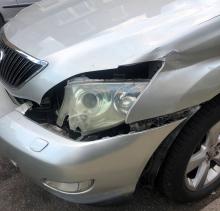A study carried out in Argentina by NGO Luchemos por la Vida reveals that female drivers are safer than male drivers. The study was based on data from 4,724 drivers in Buenos Aires city. The results reveal that women drivers take fewer risks and are less likely to break the law than male drivers. Women drivers wear seat belts more than men, are less likely to drive through red lights and are also less likely to use a phone while behind the wheel. The findings match previous international studies.
A study carried out in Argentina by NGO Luchemos por la Vida reveals that female drivers are safer than male drivers. The study was based on data from 4,724 drivers in Buenos Aires city. The results reveal that women drivers take fewer risks and are less likely to break the law than male drivers. Women drivers wear seat belts more than men, are less likely to drive through red lights and are also less likely to use a phone while behind the wheel. The findings match previous international studies.
The Argentinian study shows that 85% of women wear seat belts while driving, compared to 65% of men. Men drive through red lights 48% more times than women. And males are 41% more likely to be using mobile phones while driving than females. Men take unnecessary risks because they feel they are in total control of their vehicles, something women do not feel. However, women's accidents normally have to do with turning the car or parking it, which are less likely to put lives at risk.
Meanwhile data from Venezuela reveals that a mere 22% of front seat vehicle occupants wear seat belts. The report was compiled by Venezuela's road safety research centre Cesvial. The study also reveals that the percentage of rear seat passengers wearing a seat belt is just 3% in the country. According to research, if all vehicle occupants in Venezuela were to wear seat belts an estimated 1,600 lives would be saved/year. The country has a poor record for road safety and is amongst the worst in Latin America for its crash rate and risk factor when travelling by road.
The Argentinian study shows that 85% of women wear seat belts while driving, compared to 65% of men. Men drive through red lights 48% more times than women. And males are 41% more likely to be using mobile phones while driving than females. Men take unnecessary risks because they feel they are in total control of their vehicles, something women do not feel. However, women's accidents normally have to do with turning the car or parking it, which are less likely to put lives at risk.
Meanwhile data from Venezuela reveals that a mere 22% of front seat vehicle occupants wear seat belts. The report was compiled by Venezuela's road safety research centre Cesvial. The study also reveals that the percentage of rear seat passengers wearing a seat belt is just 3% in the country. According to research, if all vehicle occupants in Venezuela were to wear seat belts an estimated 1,600 lives would be saved/year. The country has a poor record for road safety and is amongst the worst in Latin America for its crash rate and risk factor when travelling by road.





